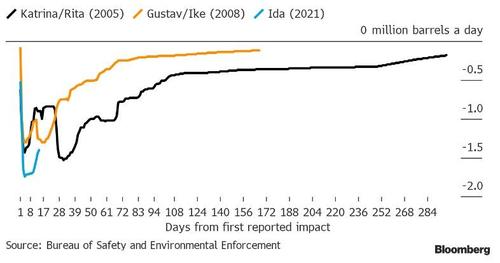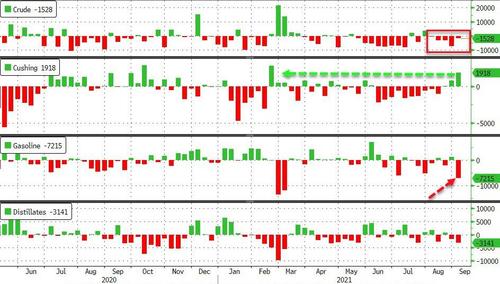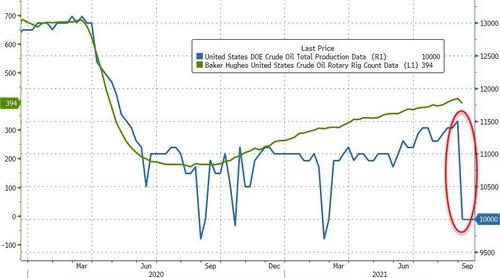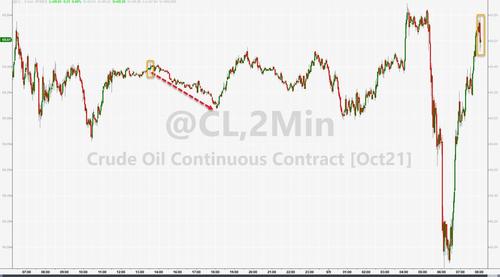Oil Price Chaos Continues After Record Crude Production Plunge, Major Gasoline Draw
Tyler Durden
 Oil prices have swung wildly this morning ahead of the official inventory data following reports that China will release some of its strategic crude reserves. Oil prices have swung wildly this morning ahead of the official inventory data following reports that China will release some of its strategic crude reserves.
In a late announcement on Thursday, Beijing said it had tapped its giant oil reserves to "to ease the pressure of rising raw material prices." The Chinese government didn't offer further details, but people familiar with the matter said the statement referred to millions of barrels the government offered in mid-July.
“On its face, it’s a pretty clear statement of an intent to use the SPR to dampen oil prices for domestic refiners,” said Bob McNally, a former senior White House policy adviser who now runs Rapidan Energy Group, a consulting firm in Washington.
For now, the algos will be focused on the inventory data for signs of Delta's impact... but perhaps it is Ida's impact that will confound most.
Hurricane Ida may not have been the deadliest or most damaging weather system ever to smash into the U.S., but its initial impact on Gulf of Mexico oil supply has been greater than any other storm in history.

Ida has been responsible for the loss of 20.7 million barrels of output in the 13 days since the Bureau of Safety and Environmental Enforcement issued its first assessment of production shut-ins as a result of the storm. That’s 40% more crude than was lost to Katrina over the same period in 2005.
API
-
Crude -2.882mm (-3.8mm exp)
-
Cushing +1.794mm
-
Gasoline +6.414mm (-3.6mm exp)
-
Distillates -3.748mm (-3.0mm exp)
DOE
-
Crude -1.528 (-3.8mm exp)
-
Cushing +1.918mm
-
Gasoline -7.215mm (-3.6mm exp)
-
Distillates -3.141mm (-3.0mm exp)
API reported a smaller than expected crude draw and wholly unexpected gasoline build last week but the official data showed an even smaller crude draw but a huge gasoline draw

Source: Bloomberg
Rig counts dropped last week, likely impacted by Ida's imminent arrival but production crashed by a record 1.5mm barrels/day...

Source: Bloomberg
Currently only 20% of the offshore platforms are still evacuated, but 77% of oil production remains shut-in. One of the drivers behind the slow return of oil and gas has been Louisiana’s Port Fourchon -- a key hub for oil and gas platforms handling more than 18% of its entire oil supply. As of Sept. 7, work to restore operations at the port is still ongoing.
A chaotic morning in crude saw WTI plunge to a $67 handle only to rip back up near a $70 handle ahead of the official DOE data, and dipped a little after...

“The move by China is no doubt designed to ease upward price pressures on rising oil import costs,” said Ryan Fitzmaurice, commodities strategist at Rabobank.
“It is unlikely to have the desired effect, as we see it. For starters, it signals vulnerability to the financial oil market, and even more so it is not enough physical supply to move the dial.”
 our mission: our mission:
to widen the scope of financial, economic and political information available to the professional investing public.
to skeptically examine and, where necessary, attack the flaccid institution that financial journalism has become.
to liberate oppressed knowledge.
to provide analysis uninhibited by political constraint.
to facilitate information's unending quest for freedom.
our method: pseudonymous speech...
Anonymity is a shield from the tyranny of the majority. it thus exemplifies the purpose behind the bill of rights, and of the first amendment in particular: to protect unpopular individuals from retaliation-- and their ideas from suppression-- at the hand of an intolerant society.
...responsibly used.
The right to remain anonymous may be abused when it shields fraudulent conduct. but political speech by its nature will sometimes have unpalatable consequences, and, in general, our society accords greater weight to the value of free speech than to the dangers of its misuse.
Though often maligned (typically by those frustrated by an inability to engage in ad hominem attacks) anonymous speech has a long and storied history in the united states. used by the likes of mark twain (aka samuel langhorne clemens) to criticize common ignorance, and perhaps most famously by alexander hamilton, james madison and john jay (aka publius) to write the federalist papers, we think ourselves in good company in using one or another nom de plume. particularly in light of an emerging trend against vocalizing public dissent in the united states, we believe in the critical importance of anonymity and its role in dissident speech. like the economist magazine, we also believe that keeping authorship anonymous moves the focus of discussion to the content of speech and away from the speaker- as it should be. we believe not only that you should be comfortable with anonymous speech in such an environment, but that you should be suspicious of any speech that isn't.
www.zerohedge.com
| 

![[Most Recent Quotes from www.kitco.com]](http://www.kitconet.com/images/live/s_gold.gif)
![[Most Recent USD from www.kitco.com]](http://www.weblinks247.com/indexes/idx24_usd_en_2.gif)
![[Most Recent Quotes from www.kitco.com]](http://www.kitconet.com/images/live/s_silv.gif)


